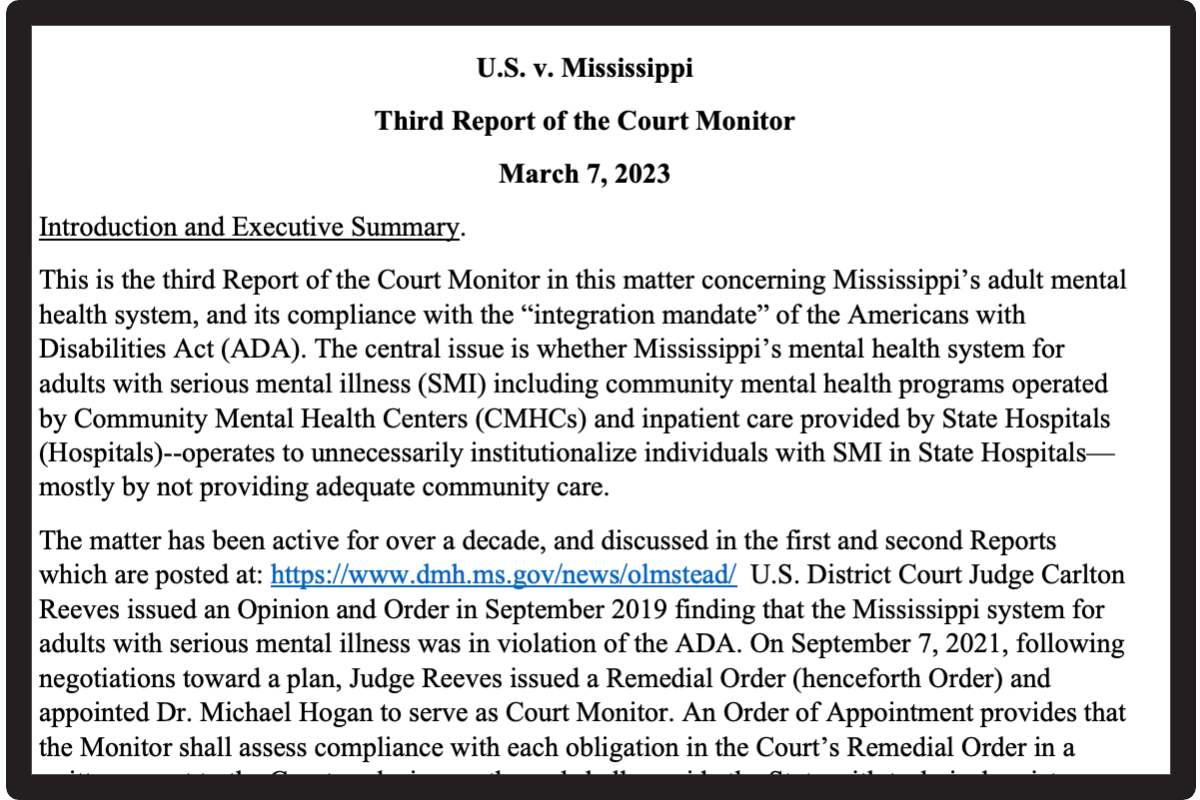Judge Carlton Reeves has scheduled a virtual status conference regarding the third monitoring report in the United States v. Mississippi mental health lawsuit for April 26, 2023, at 10 a.m. The status conference will be presented via Zoom. The public may join by clicking on the following link: https://www.zoomgov.com/j/1604234532?pwd=SFFEczJnVkM5b1NjMDZQUnROYnROZz09
Highlights from the Third Monitoring Report:
Dr. Hogan explains (page 7), “The monitor assesses compliance for each Requirement of the Order using a simple framework:
1. Was action taken to address the Requirement (e.g., a program put in place, or a procedure implemented)?
2. Is that action working as intended (e.g., is the program serving people according to the State’s standards)?
3. Is the action contributing to the goal of reducing unnecessary institutionalization in Hospitals?”
Dr. Hogan rates the State as “compliant” on a few items. Those including some aspects of discharge planning, the State’s work connecting a sample group of patients to services, and the State’s assistance to chancery clerks regarding commitment.
He rates the State “in partial compliance” on all other items. Most services are rated “as in partial compliance” because the legislature funded them, and the Department of Mental Health is developing ways to assess their fidelity. Still, those services aren’t yet being monitored for fidelity by the State. Dr. Hogan notes that there are challenges with care coordination.
He commends the Department of Mental Health’s efforts in training, discharge planning and establishing court liaisons to work with chancery clerks on commitments. He also clarifies that court liaisons complete pre-commitment screenings and work with chancery courts to divert people to community-based services.
Dr. Hogan reviews progress in the mental health system since the original Justice Department letter of findings from 2011 and describes substantial improvement in the planning and development services by the State. He says, “The next step is assuring that these programs are actually available to serve people across Mississippi.” We agree.
He then adds, “The scope of progress is substantial. But the work is not complete, and some conditions remain that should satisfy no one.”
Background of the case: In 2019, after a four-week trial, Judge Carlton Reeves ruled that Mississippi’s mental health system violates the Americans with Disabilities Act (ADA) because adults with mental illness end up segregated in facilities due to not having the support they need. Judge Reeves then imposed a remedy on the state mental health system, a set of conditions the system must meet to comply with the ADA. He appointed Dr. Michael Hogan to monitor the State’s remedy implementation.
The heart of this lawsuit is this: Does Mississippi’s mental health system provide the right kind of help so that people with serious mental illnesses can live in the community if they want to? Although the lawsuit concerns adults, this question is relevant to anyone affected by serious mental health challenges, including children.
The remedy primarily requires the state mental health system to fund and make available services already in the Department of Mental Health’s Operational Standards.

